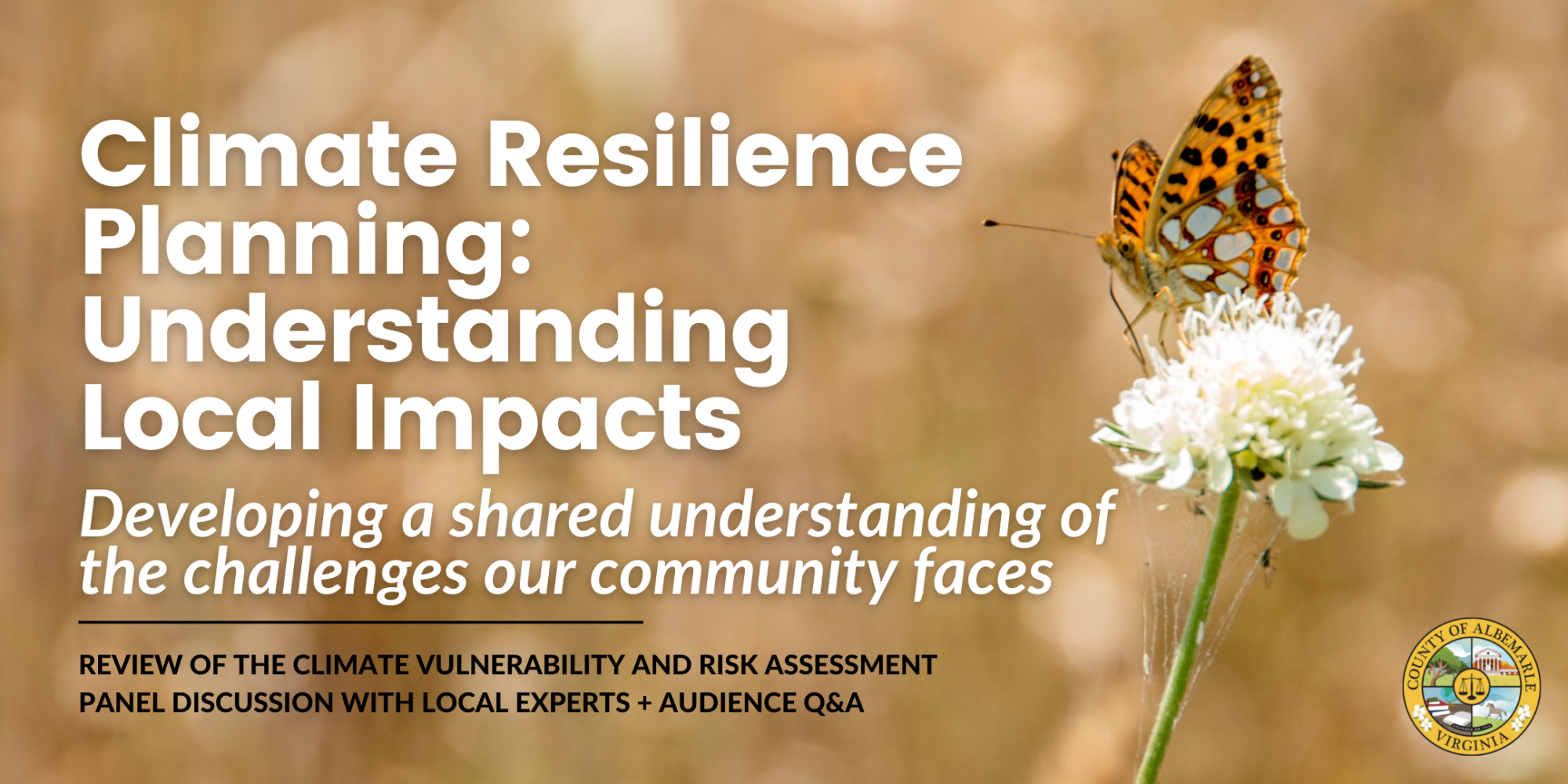
Albemarle County is already experiencing climate change—longer heat waves, more intense rain events, and seasonal disruption. To prepare for greater extremes in weather patterns, we will work with the community to develop a climate adaptation and resilience plan. The first step in producing this plan is to understand how weather events exacerbated by climate change—so-called climate hazards—will impact our community, environment, and infrastructure. The County’s Climate Vulnerability and Risk Assessment, published in June 2022, presents this information. Preparing for Resilience provides an overview of the key takeaways.
Join us for a discussion of the main conclusions of this report and an overview of our next steps in building resilience as a community and local government. We’ll begin with an overview of the report’s key takeaways, followed by a panel discussion by local experts to help contextualize these themes within the daily lives of community members. We’ll close with an outline of next steps in preparing for resilience, including our community engagement process to help develop a climate adaptation resilience plan.
Register to Attend In Person
This event will be held at Lane Auditorium, located on the second floor of the County Office Building. Register Here.
Register to Attend Virtually
View the event via Zoom. Register Here.
About Our Panelists
Carreen de Cardenas is a graduate student at UVA, studying Civil Engineering and Urban and Environmental Planning. Her focus is on sustainable and resilient transportation systems. Before starting graduate school, she worked at the Thomas Jefferson Planning District Commission on bike and pedestrian planning for the region, as well as at Bellair Farm, a local organic farm in Albemarle county. This past summer, she interned at Piedmont Environmental Council as a Climate Fellow Intern.
Dr. Irène Mathieu is a pediatrician and public health researcher at UVA, where she is an assistant director of the Center for Health Humanities and Ethics. Dr. Mathieu serves on the steering committee of Virginia Clinicians for Climate Action. She is also a writer of poetry, fiction, and nonfiction, and has been called an "ecopoet" for her creative work related to the climate crisis. A mother, amateur chef, hiker, and swimmer, Dr. Mathieu spent much of her childhood in Albemarle County.
Brian Morse is a wildlife biologist/ecologist and co-founder of Virginia Forestry and Wildlife Group, a natural resource management company based in Albemarle County. He received a Bachelor’s degree in Fisheries and Wildlife Science from North Carolina State University and a Master’s degree from the University of Georgia Warnell School of Forestry and Natural Resources with a concentration in wildlife management and ecology. Brian’s broad interests have allowed him to work promoting biodiversity and habitat throughout the southeastern United States, from coastal barrier islands and Piedmont prairies to Appalachian mountain forests. Through his work with pollinator habitats, Brian has become involved with local efforts to support both native and honeybee populations. Brian lives near Batesville, in western Albemarle County with his wife, son and lots of great wildlife.
Emily Pelliccia has worked in public safety for almost 30 years as a firefighter, paramedic, emergency manager and chief officer currently serving as Deputy Chief of Community Risk and Resilience for Albemarle County Fire Rescue. She recently completed a master’s degree at the Naval Postgraduate School where her research was focused on early identification of risks and hazards and the development of upstream strategies to mitigate the collective impact on public health and safety.